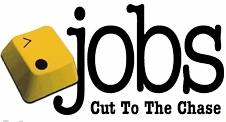 As the clock counts down on the public comment period regarding the expansion of the .jobs Internet address, opponents this morning launched their campaign to stop it.
As the clock counts down on the public comment period regarding the expansion of the .jobs Internet address, opponents this morning launched their campaign to stop it.
Since this is being written on Friday, I can only tell you what’s supposed to be happening today: posts discussing the proposed .jobs changes should be appearing on blogs; tweets are going out to followers of some job board leaders; others are sending messages to their LinkedIn groups, updating their status on Facebook, while still others are sending emails.
From what I’ve heard, the messages will raise issues similar to those in a letter by Ted Daywalt, founder and CEO of VetJobs, and in commentary by Steven Rothberg, founder and president of CollegeRecruiter.
 The opposition is being championed by the job board industry and in particular, its trade group, the International Association of Employment Web Sites. Until now, the group has kept a low public profile about the proposal to allow almost any name to be used in conjunction with a .jobs Internet extension. (Under the original rules, only company names could be used.)
The opposition is being championed by the job board industry and in particular, its trade group, the International Association of Employment Web Sites. Until now, the group has kept a low public profile about the proposal to allow almost any name to be used in conjunction with a .jobs Internet extension. (Under the original rules, only company names could be used.)
Behind the scenes, the group exerted its influence to get a seat on a SHRM advisory group that reviewed the expansion plan. SHRM is involved because it sponsored the creation of the .jobs domain and still represents the HR community, the nominal beneficiary of using .jobs for corporate career sites.
SHRM had to sign off on the plan in order for it to even be considered.
Now, the job board industry is taking an aggressive position to convince the Internet naming authority — Internet Corporation for Assigned Names and Numbers — to reject the expansion. Besides the public information effort, it has also hired a lawyer and created a committee to focus on the issue.
Last week Peter Weddle, executive director of the IAEWS, the trade association, told me that the broadening of the .jobs usage is not in the best interest of his group.
That’s no surprise, considering that Employ Media, the .jobs registrar, essentially the seller of the addresses, signaled its interest in launching job boards — tens of thousands of them — with an address ending in .jobs.
It would be easy to dismiss the objections of the job board industry, therefore, as mere self-interest; who wants more competition in an arena that is so crowded no one has an accurate count of the world’s job boards?
Still, there are plenty of unresolved questions that may now end up being raised in public.
I spoke with a couple of job board folks last week who planned to be posting today. They complained about a lack of transparency in the process and the corrupting of a noble goal — easy access for job seekers to specific company jobs.
If the expansion of .jobs is approved, there’s also the question of how exactly the new names be issued. Employ Media says it will use a three-step process, starting with an RFP “to invite interested parties to propose specific plans for registration, use, and promotion of domains that are not their company name.” Who decides and what will the criteria be?
What about the job seekers? How will expanding the number of job boards help them? More to the point, no one appears to have asked them. SHRM polled a sample of its members on the expansion plan, asking their opinion about its usefulness including its usefulness for job seekers.
However, job seekers may not care. They’re using the big board brands and search engines like Indeed and SimplyHired. Or searching niche familiar niche sites.
The SHRM survey concluded that “The new .jobs seems quite useful for recruitment needs with 67% rating either 4 or 5 (with an average rating of 3.72).”
Another survey, this one running almost five years in duration and open to every company in the world, found the .jobs address of minimal value. According to the reports Employ Media files with ICANN every month, it never sold more than 15,000 addresses.